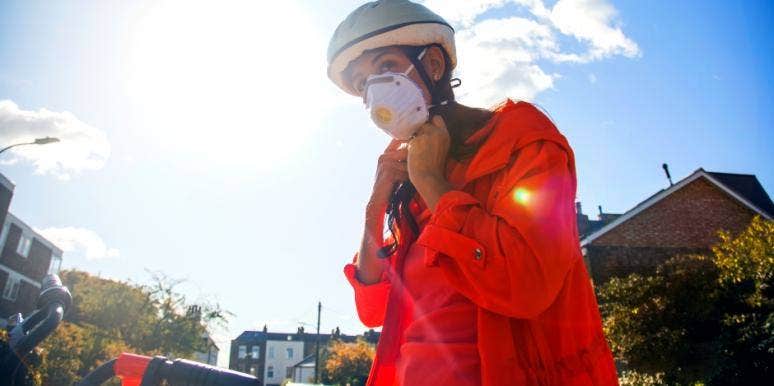Will Warm Weather Help Stop Coronavirus From Spreading?
Flu season ends after winter. Could it be the same for coronavirus?
 getty
getty Summer is upon us, but things are not as we might hope them to be. This pandemic is continuing to take away our liberties and is not stopping for our summer plans. This year, it looks like we’re going to have all the humidity and soaring temperatures with none of the rooftop bars and beach vacations.
Coronavirus is continuing to sweep across the globe and run rampage through our healthcare systems. Even as some states begin to lift restrictions, strict measurements that control the coronavirus spread dictate our daily lives.
Any plans to come out of quarantine and go back to normal life seem unlikely for Summer 2020. Yet discussion persists on what an increase in temperatures could mean for the virus.
Will warm weather stop the spread of coronavirus?
What about recent speculation that the coronavirus could finally be slowing down as summer begins to heat up? If the virus has survived globally since January, why do people think summer will bring an end to COVID-19?
For millions of us isolating at home, the idea that we could return to a somewhat normal life just in time to enjoy summer is a hope that keeps us going. So, it’s no wonder people are grasping on to reports that seasonal changes could stop the spread of coronavirus.
Other epidemics in history have followed seasonal patterns, and we all know that the flu is pretty much unheard of outside of winter months.
On top of this, President Trump has publicly referenced new research by his Department of Homeland Security and suggested that sunlight, heat, and humidity could kill COVID-19. (This research was first referenced late last month and has remained uncorroborated.)
Trump also floated the possibility that the virus could be seasonal, and embraced the promise of unproven drugs and “pretty powerful” research that suggests light could be used as a treatment. However, these suggestions have remained unsubstantiated by scientists and experts for several notable reasons.
1. It’s not summer everywhere at once.
Speculations that the virus will slow in summer are generated and spread entirely by officials in the northern hemisphere, and seem to neglect the fact that the virus has spread to every continent besides Antarctica.
A review published by the National Academies of Sciences, Engineering, and Medicine (NAS) notes, "Given that countries currently in 'summer' climates, such as Australia and Iran, are experiencing rapid virus spread, a decrease in cases with increases in humidity and temperature elsewhere should not be assumed."
This suggests that the virus survives even as temperatures begin to heat up.
As the northern hemisphere enters summer, the southern hemisphere could become more susceptible to the virus. A global reversal in transmission hotspots means that even as the virus might slow in one place, it will be kept alive in others.
2. Other viruses don't disappear in summer.
Yes, flu season usually ends after winter. Yes, our immune systems are stronger in the summer. Yes, warmer weather does mean we spend less time indoors, in close proximity to one another.
But basing coronavirus predictions on evidence from the regular flu is inaccurate.
The human population has developed a level of immunity to the flu that has not yet been reached for the coronavirus, meaning our immune systems will not be able to fight it off just because it's summer. SARS-CoV-2, the strain of coronavirus that causes COVID-19, previously caused an outbreak in 2003 and did not show any evidence of seasonality.
Coronavirus is among many global pandemics throughout history. And the others didn't end with the arrival of summer.
“There have been 10 influenza pandemics in the past 250-plus years — two started in the northern hemisphere in winter, two in the summer and three in the fall,” the NAS report indicated. “All had a peak second wave approximately six months after the emergence in the human population, regardless of when the initial introduction occurred.”
3. It’s too early to say.
So far, coronavirus has defied all public expectations, proving that we simply do not know enough about COVID-19 to make any predictions about when, or if, it will go away.
Most assumptions about how the virus will progress are based on history rather than science, and this history may not be applicable to coronavirus.
Dr. Nancy Messionnier of the Centers for Disease Control and Prevention was cautionary when speaking to reporters about predicting a slowdown of cases with warmer weather. "I think it's premature to assume that," she said. "We haven't been through even a single year with this pathogen."
Making these predictions could be dangerous and encourage people to relax restrictions before it's safe to do so.
4. Even if it slows in summer, COVID-19 could come back.
Until there's a successful vaccine for the virus, it's unlikely we will see a total end to its spread.
As stated in the NAS report, a second surge of viruses is common in previous epidemics, and the same could be ahead for coronavirus. A premature relaxing of restrictions leads to complacency, and if people stop protecting themselves, the virus could resurge in a few months.
And it’s not just the coronavirus we should be worried about — winter flu season will weaken our immune systems and make us vulnerable if coronavirus is still spreading.
Relying on warmer weather as a cure could prevent governments from implementing relevant policies that will protect us in the long run.
Alice Kelly is a writer with a passion for lifestyle, entertainment, and trending topics.

